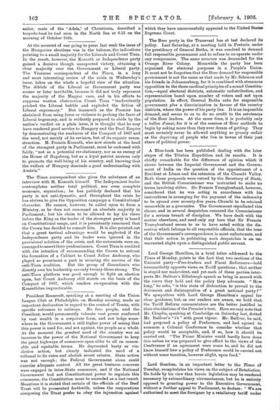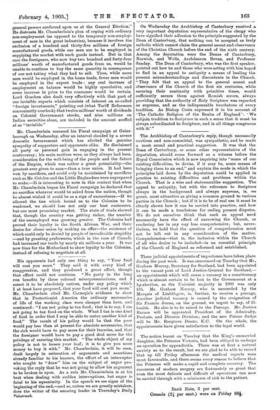Lord Goscben, in an important letter to the Times of
Tuesday, recapitulates his views on the subject of Retaliation. He holds by his view that heroic legislation may be rendered necessary by extraordinary circumstances, but be is entirely opposed to granting power to the Executive Government, without a further appeal to Parliament, to decslare : " We are authorised to meet the foreigner by a retaliatory tariff under
general powers conferred upon us at the General Election." He distrusts Mr. Chamberlain's plan of coping with ordinary non-employment (as opposed to the temporary non-employ- ment of men in the great industries), because it involves the exclusion of a hundred and thirty-five millions of foreign manufactured goods, while our men are to be employed in supplying the market with such goods instead. But in that case the foreigners, who now buy two hundred and forty-four millions' worth of manufactured goods from us, would be unable to continue to buy the same quantity in consequence of our not taking what they had to sell. Thus, while more men would be employed in the home trade, fewer men would be employed in the export trade : any real increase of employment on balance would be highly speculative, and some increase in price to the consumer would be certain. Lord Goschen also dealt very effectively with that part of our invisible exports which consists of interest on so-called "foreign investments," pointing out (what Tariff Reformers conveniently overlook) that twelve millions' worth of dividends on Colonial Government stocks, and nine millions on Indian securities alone, are included in the amount scoffed at as "invisible."











































 Previous page
Previous page